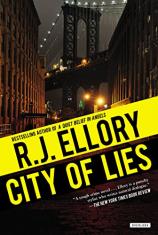City of Lies
Review
City of Lies
It has been said and/or written that everyone who has read one book by R.J. Ellory has subsequently bought and read them all. I don’t know if that’s true, though after reading CITY OF LIES, I certainly believe it to be so.
I also acknowledge that I’ve been framing an issue incorrectly when I’ve stated --- usually in discussing a novel on the order of RAIN GODS by James Lee Burke or NO COUNTRY FOR OLD MEN by Cormac McCarthy --- that there are crime novels that transcend the genre and elevate themselves to the status of literary fiction. I was halfway through this book when I realized that I have gotten it backwards. Books such as CITY OF LIES take literary fiction and elevate it to the lofty reaches of the crime novel --- the crime novel perfectly and wonderfully executed. After all, what is LES MISERABLES? THE ADVENTURES OF HUCKLEBERRY FINN? Even A TALE OF TWO CITIES, a crime and political thriller if ever there was one? I thought of all these books, and others, as I read Ellory’s latest.
"The real attraction...is Ellory’s literary style --- terse and chopped here, eloquent there, with bits of philosophy thrown in, the types of issues that occur to someone at 3:35am and chew uneasily upon the consciousness until morning."
CITY OF LIES is a crime novel, but it is also a coming-of-age novel, in a sense, a perfect one for an era when 30 has become the new 20. Published in Great Britain in 2006 but seeing publication in the United States some seven years later, the book introduces John Harper, a thirty-something (a very young thirty-something) reporter for the Miami Herald who is uneasily sleepwalking his way through his somewhat unsatisfactory life, ghosting columns while stuck in an amber-like ennui. Harper’s life changes completely over the course of several days in late December, beginning with a telephone call from his Aunt Evelyn in New York, who raised the orphaned Harper from his early childhood but who has been all but estranged from him during his so-called adult life. Evelyn’s message to Harper is that his father --- a man he has not seen in over three decades and whom he believed to be long-dead --- has been shot while trying to stop a liquor store holdup and is near death in a hospital intensive care ward.
The message is full of revelations, direct and otherwise --- the circumstances of the telephone call incidentally reveal a betrayal that highlights Harper’s naivete --- and results in Harper journeying to New York. He is told by almost everyone there --- from his aunt to Duchaunak, a downtrodden cop, to Harper’s father himself, during a brief moment of consciousness --- to leave New York, and to do so immediately. Notice that I said “almost” everyone. Nearly simultaneously with his arrival at his father’s bedside, Harper is greeted by Walt Freiberg, a family friend whom Harper barely remembers from his childhood. Freiberg wants Harper to stay for a bit, showering him with meals at exclusive restaurants, covering his hotel expenses, providing him with a proper wardrobe, and otherwise making the death watch over his father, long out of his life, to be as pleasant as possible.
However, it is not the material things that Freiberg provides to Harper that ultimately causes him to stay. The primary attraction is a woman named Cathy Hollander, with whom he is almost immediately smitten. There are several problems, the major one being that virtually everyone is lying to Harper about one thing or another. Evelyn has been lying to him all his life --- about his father, the circumstances of his mother’s death, and his uncle’s suicide. Freiberg is lying about his intentions, his activities, and his reasons for keeping Harper in New York. And Cathy? Watch out for that one. What about Duchaunak? He may be telling the truth as he believes it, but he is so obsessed with putting Harper’s father in prison, even at this late date, that he may well be delusional.
As for Harper, he has put himself in terrible danger simply by returning to New York and involuntarily becoming the pawn in a very dangerous plan that will forever change the balance of power in the New York underworld. As the pivotal moment of execution approaches, Harper is confronted with a frightening dilemma: What is the right thing to do, when anything he might do is wrong?
A complex plot? Yes, but it is an intriguing one as well. The real attraction, though, is Ellory’s literary style --- terse and chopped here, eloquent there, with bits of philosophy thrown in, the types of issues that occur to someone at 3:35am and chew uneasily upon the consciousness until morning. But for one example: an observation is made by one of the characters about the reason for suicide. It is as succinct and true as anything you are likely to read in this or any year, stark and simple in its presentation. CITY OF LIES is full of moments like these, as well as angst, dark brutality, mystery, and even redemption. What a way to end the year.
Reviewed by Joe Hartlaub on November 15, 2013





